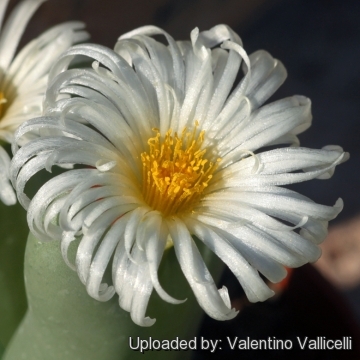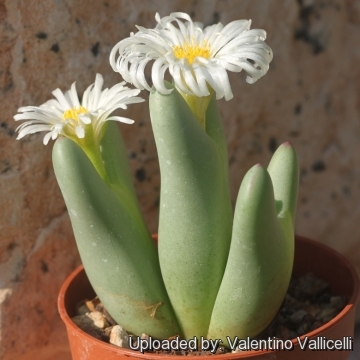Donate now to support the LLIFLE projects.
Your support is critical to our success.
Your support is critical to our success.
Accepted Scientific Name: Conophytum bilobum lacteum hort.
n. n., nov. comb. ined. [as: Conophytum lacteum L. Bolus 1967]

Conophytum lacteum (Conophytum bilobum lacteum) Photo by: Valentino Vallicelli
Synonyms:
- Conophytum bilobum lacteum hort.
- Conophytum lacteum L. Bolus
See all synonyms of Conophytum bilobum
back
Accepted name in llifle Database:Conophytum bilobum (Marloth) N.E.Br.
Gard. Chron. 1922, Ser. III. lxxii. 83.
Synonymy: 122
- Conophytum bilobum (Marloth) N.E.Br.
- Derenbergia biloba (Marloth) Schwantes
- Mesembryanthemum bilobum Marloth
- Conophytum absimile L. Bolus
- Conophytum absimile var. major L. Bolus
- Conophytum absimile f. majus L. Bolus
- Conophytum absimile f. umbrosum L. Bolus
- Conophytum aequale L. Bolus
- Conophytum albescens N.E.Br.
- Mesembryanthemum albescens (N.E.Br.) hort.
- Conophytum ampliatum L. Bolus
- Conophytum amplum L. Bolus
- Conophytum andausanum N.E.Br.
- Conophytum andausanum var. immaculatum L. Bolus
- Conophytum angustum L. Bolus
- Conophytum angustum N.E.Br.
- Conophytum anomalum L. Bolus
- Conophytum apiatum N.E.Br.
- Derenbergia apiata (N.E.Br.) Schwantes
- Mesembryanthemum apiatum N.E.Br.
- Conophytum apiculatum N.E.Br.
- Conophytum approximatum Lavis
- Conophytum auctum f. approximatum (Lavis) Rawé
- Conophytum asperulum L. Bolus
- Conophytum asperulum var. brevistylum L. Bolus
- Conophytum auctum N.E.Br.
- Conophytum australe L. Bolus
- Conophytum barkerae L. Bolus
- Conophytum beekenkampianum Tischer
- Conophytum brevisectum L. Bolus
- Conophytum cauliferum N.E.Br.
- Derenbergia caulifera (N.E.Br.) Schwantes
- Mesembryanthemum cauliferum (N.E.Br.) hort.
- Conophytum cauliferum var. lekkersingense L. Bolus
- Conophytum christiansenianum L. Bolus
- Conophytum citrinum L. Bolus
- Conophytum compressum N.E.Br.
- Conophytum conradii L. Bolus
- Conophytum convexum L. Bolus
- Conophytum cordatum Schick & Tischer
- Conophytum cordatum var. macrostigma L. Bolus
- Conophytum coriaceum L. Bolus
- Conophytum crassum L. Bolus
- Conophytum curtum L. Bolus
- Conophytum dennisii N.E.Br.
- Conophytum difforme L. Bolus
- Conophytum dilatatum Tischer
- Conophytum dissimile L. Bolus
- Conophytum distans L. Bolus
- Conophytum divaricatum N.E.Br.
- Conophytum diversum N.E.Br.
- Conophytum dolomiticum Tischer
- Conophytum ecarinatum L. Bolus
- Conophytum ecarinatum var. angustum L. Bolus
- Conophytum ecarinatum var. mutabile
- Conophytum excisum L. Bolus
- Conophytum exsertum N.E.Br.
- Conophytum furcatum N.E.Br.
- Conophytum geminum N.E.Br.
- Conophytum glaucum N.E.Br.
- Conophytum gonapense L. Bolus
- Conophytum gonapense var. numeesicum L. Bolus
- Conophytum grandiflorum L. Bolus
- Conophytum gregale N.E.Br.
- Conophytum igniflorum n.n.
- Conophytum inclusum L. Bolus
- Conophytum incurvum N.E.Br. & Tischer
- Conophytum incurvum var. leucanthum (Lavis) Tischer
- Conophytum indefinitum L. Bolus
- Conophytum insigne L. Bolus
- Conophytum klipbokbergense L. Bolus
- Conophytum kubusbergense Tischer
- Conophytum largum L. Bolus
- Conophytum latum L. Bolus
- Conophytum lavisianum L. Bolus
- Conophytum laxipetalum N.E.Br.
- Conophytum lekkersingense L. Bolus
- Conophytum leucanthum Lavis
- Conophytum leucanthum var. multipetalum L. Bolus
- Conophytum macrostigma (L. Bolus) Schwantes
- Conophytum markoetterae Schwantes
- Conophytum meyerae Schwantes
- Conophytum meyerae f. alatum Tischer
- Conophytum meyerae f. apiculatum (N.E.Br.) Tischer
- Conophytum meyerae f. asperulum (L. Bolus) H.Jacobsen
- Conophytum meyerae f. pole-evansii (N.E.Br.) Tischer
- Conophytum nelianum Schwantes
- Conophytum noisabisense L. Bolus
- Conophytum nutaboiense Tischer
- Conophytum obtusum N.E.Br.
- Conophytum obtusum var. amplum (L. Bolus) Rawé
- Conophytum ovatum L. Bolus
- Conophytum parvulum L. Bolus
- Conophytum philippii L. Bolus
- Conophytum piriforme L. Bolus
- Conophytum plenum N.E.Br.
- Conophytum pluriforme L. Bolus
- Conophytum pole-evansii N.E.Br.
- Conophytum proximum L. Bolus
- Conophytum proximum Schwantes
- Mesembryanthemum proximum N.E.Br.
- Conophytum recisum N.E.Br.
- Conophytum simile N.E.Br.
- Conophytum simplum N.E.Br.
- Conophytum sitzlerianum Schwantes
- Conophytum smithersii L. Bolus
- Conophytum sororium N.E.Br.
- Conophytum springbokense N.E.Br.
- Conophytum strictum L. Bolus
- Conophytum strictum var. inaequale L. Bolus
- Conophytum stylosum (N.E.Br.) Tischer
- Mesembryanthemum stylosum N.E.Br.
- Conophytum subacutum L. Bolus
- Conophytum subcylindricum L. Bolus
- Conophytum subtenue L. Bolus
- Conophytum supremum L. Bolus
- Conophytum tectum N.E.Br.
- Conophytum tumidum N.E.Br.
- Conophytum tumidum var. asperulum L. Bolus
- Conophytum umdausense L. Bolus
- Conophytum variabile L. Bolus
- Conophytum vlakmynense L. Bolus
Conophytum bilobum subs. altum (L. Bolus) S.A.Hammer
Gen. Conophytum
Synonymy: 12
- Conophytum bilobum subs. altum (L. Bolus) S.A.Hammer
- Conophytum altum L. Bolus
- Conophytum altum var. plenum L. Bolus
- Conophytum apertum Tischer
- Conophytum connatum L. Bolus
- Conophytum corniferum Schick & Tischer
- Conophytum durnale N.E.Br.
- Conophytum gracile N.E.Br.
- Conophytum gracile var. majusculum L. Bolus
- Conophytum graciliramosum L. Bolus
- Conophytum luiseae Schwantes
- Conophytum luiseae var. papillatum L. Bolus
Conophytum bilobum subs. claviferens S.A.Hammer
Dumpling & His Wife: New Views of Gen. Conophytum 86 (2002).
Accepted name in llifle Database:
Conophytum bilobum var. elishae (N.E.Br.) S.A.Hammer
Dumpling & His Wife: New Views of Gen. Conophytum 85 (2002).
Synonymy: 4
- Conophytum bilobum var. elishae (N.E.Br.) S.A.Hammer
- Conophytum elishae N.E.Br.
- Derenbergia elishae (N.E.Br.) Schwantes
- Mesembryanthemum elishae N.E.Br.
Conophytum bilobum subs. gracilistylum (L. Bolus) S.A.Hammer
Gen. Conophytum 242, without basionym ref. 1993
Synonymy: 10
- Conophytum bilobum subs. gracilistylum (L. Bolus) S.A.Hammer
- Conophytum gracilistylum N.E.Br.
- Derenbergia gracilistyla (L. Bolus) Schwantes
- Mesembryanthemum gracilistylum L. Bolus
- Conophytum chauviniae (Schwantes) S.A.Hammer
- Conophytum bilobum subs. gracilistylum f. chauviniae (Schwantes)
- Conophytum gracilistylum f. chauviniae (Schwantes)
- Derenbergia chauviniae (Schwantes) Schwantes
- Mesembryanthemum augeiforme Schwantes
- Mesembryanthemum chauviniae Schwantes
Conophytum bilobum lacteum hort.
n. n., nov. comb. ined. [as: Conophytum lacteum L. Bolus 1967]
Synonymy: 2
- Conophytum bilobum lacteum hort.
- Conophytum lacteum L. Bolus
Conophytum bilobum var. linearilucidum (Lavis) S.A.Hammer
Dumpling & His Wife: New Views of Gen. Conophytum 85 (2002).
Synonymy: 2
- Conophytum bilobum var. linearilucidum (Lavis) S.A.Hammer
Conophytum bilobum var. muscosipapillatum (Lavis) S.A.Hammer
Dumpling & His Wife: New Views of Gen. Conophytum 85 (2002).
Synonymy: 2
- Conophytum bilobum var. muscosipapillatum (Lavis) S.A.Hammer
back

Conophytum lacteum (Conophytum bilobum lacteum) Photo by: Valentino Vallicelli

Conophytum lacteum (Conophytum bilobum lacteum) Photo by: Valentino Vallicelli
| Your Actions | |
|---|---|
| Back to Conophytum index | |
| Back to Aizoaceae index | |
 |
Back to Succulents Encyclopedia index |








